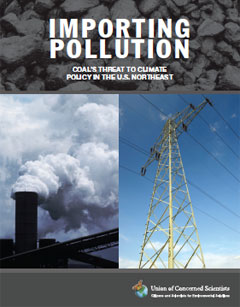The launch of the Regional Greenhouse Gas Initiative (RGGI)— which would cap carbon dioxide emissions from power plants in 10 Northeast states—marks an important milestone in the country’s response to climate change. Yet that pioneering effort could unwittingly contribute to greater use of coal elsewhere. Even a small shift to out-of-region coal plants in response to the cap would offset expected cuts in carbon emissions. Greater use of existing coal plants alone could overwhelm the Northeast’s efforts, while coal plants under development could lock the region onto a dangerous path for decades. Planned new transmission lines could help make this expanded use of coal-fired electricity possible.
In this report, the Union of Concerned Scientists examines the links between coal-fueled power and climate policy in the Northeast. It examines the role of such electricity in the region, and explores what drives and limits the use of existing coal plants and the construction of new ones. The report also suggests options to ensure the success of the Northeast’s nascent efforts to address global warming pollution and foster a national effort to tackle climate change.
Investments in energy efficiency and renewable power would reduce demand for more electricity, including coal-based power. The urgency of the climate challenge demands that RGGI states take more immediate steps to prevent greater use of coal, however. They can broaden the cap on carbon emissions, and also prioritize transmission projects that advance the region’s climate goals, rather than those that simply serve as highways for more coal-based power.
RGGI is a critical early effort to address climate change. The region must take urgent steps to keep coal plants at bay and ensure that the pioneering agreement achieves its full potential.




